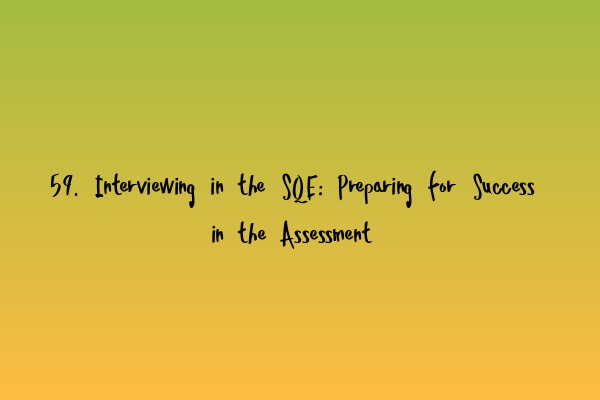59. Interviewing in the SQE: Preparing for Success in the Assessment
Interviewing is a crucial skill that every aspiring solicitor must master in order to succeed in the Solicitors Qualifying Examination (SQE). Whether it’s for an advocacy scenario or a client interview, your ability to effectively communicate and analyze legal issues will be put to the test. In this article, we will provide you with essential tips and strategies to help you prepare for interviews in the SQE and increase your chances of success in the assessment.
The Importance of Interviewing Skills in the SQE
Interviewing is an important skill for solicitors as it allows them to gather relevant information, establish rapport with clients, and present their arguments effectively. In the SQE, interview scenarios are designed to test your ability to think on your feet, analyze legal issues, communicate clearly, and demonstrate professional ethics.
By mastering the art of interviewing, you will not only excel in the assessment but also develop skills that are essential for your future legal practice. Effective interviewing skills will enable you to build trust with clients, identify key issues, gather evidence, and construct persuasive arguments.
Preparing for Interview Scenarios in the SQE
1. Familiarize Yourself with the Assessment Criteria: Understanding the assessment criteria is vital for success in the SQE interviews. Review the assessment criteria provided by the Solicitors Regulation Authority (SRA) and make sure you have a clear understanding of what is expected from you.
2. Practice, Practice, Practice: Practice is the key to mastering any skill, and interviewing is no exception. Engage in mock interview scenarios to simulate the actual assessment conditions. Consider taking SQE preparation courses that offer practice interview sessions with expert feedback.
3. Research Legal Issues: Stay up-to-date with current legal issues and developments that are relevant to the interview scenarios in the SQE. This will demonstrate your legal knowledge and help you analyze legal problems effectively during the assessment.
4. Develop Active Listening Skills: Active listening is a crucial element of effective interviewing. Practice active listening techniques such as paraphrasing, reflecting, and asking clarifying questions to ensure you fully understand the information being provided.
5. Analyze and Structure Responses: When answering interview questions, take the time to analyze the issues involved and structure your responses in a logical manner. Use the IRAC (Issue, Rule, Application, Conclusion) method to ensure your answers are clear, concise, and well-organized.
6. Develop Professional Communication Skills: Clear communication is essential for building rapport with clients and presenting your arguments effectively. Practice using plain language and avoid legal jargon that may confuse or alienate your audience.
7. Demonstrate Professional Ethics: In the legal profession, ethical behavior is of utmost importance. Familiarize yourself with the SRA’s Code of Conduct and practice ethical reasoning in your interview scenarios. Show empathy, respect confidentiality, and maintain professional boundaries.
Final Thoughts
Mastering interviewing skills is essential for success in the SQE and the legal profession as a whole. By following the tips and strategies outlined in this article, you can prepare yourself for the interview scenarios in the SQE and significantly enhance your chances of achieving success in the assessment.
Remember, practice is key to mastering any skill, so make sure to engage in mock interview scenarios and seek feedback from experts. Stay up-to-date with current legal issues, develop active listening and communication skills, and demonstrate ethical behavior in all your interactions.
For further preparation resources for the SQE, check out these related articles:
- SQE 1 Practice Exam Questions
- SQE 1 Practice Mocks FLK1 FLK2
- SQE 2 Preparation Courses
- SQE 1 Preparation Courses
- SRA SQE Exam Dates
Good luck with your SQE interview preparation!
